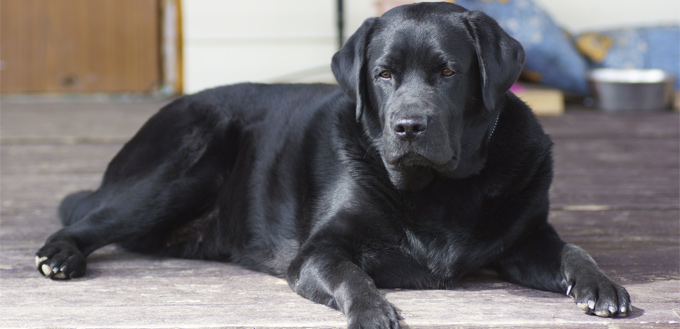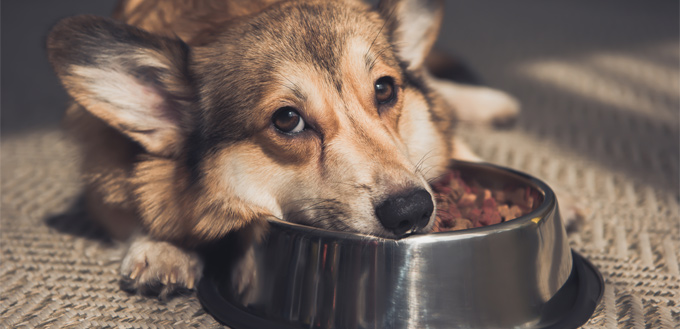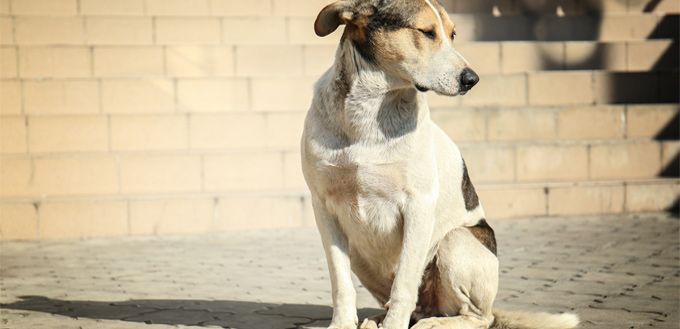When any pet passes away, it is a sad time for every member of the family. That includes fellow pets too. In fact, grief in dogs is incredibly common who are often seen to mourn the loss of their chum by whining, being lethargic and copying behavior that their friend used to perform.
When you cannot talk to a dog and reason with it through logic, how can you, therefore, help them deal with their grief in a constructive way to support them on their way to happiness again? We look at the five best ways to help your pet deal with grief here – remarkably the majority of them are not too dissimilar to how we as humans would want to be supported through a difficult time.
To be able to help your dog, you first need to identify that they are grieving in the first place. Dogs who are in a state of mourning will display the following behaviors. Firstly, it is incredibly common for them to have a loss of appetite, much like we would do as humans. This can manifest itself in how much they eat but also within the speed they eat. They may suddenly inhale their food or they may start to graze at their bowl throughout the day. Furthermore, they may sleep fitfully or for very short periods of time.

Dogs will also, more likely than not, become much clingier and demand attention from their owners when a fellow dog from the household has passed away. Some dogs may exhibit very different behavior too – especially if the alpha of the pair was the one to pass away. In these instances, the living dog will often become yappier at passers-by in an effort to protect their owner. This can also simply manifest itself in your living dog becoming more confident and outgoing.
Mostly, however, they will appear to be much more lethargic than usual as well as listless. It can be heartbreaking to see, but the ways listed here can be invaluable when helping them get over the loss of a friend.
Continue With Positive Reinforcement Training – In The Right Areas
If your dog exhibits mournful behavior like whining at doors, do not pander to it. It may sound harsh as well as incredibly difficult to implement, but it really is for the best. By cuddling your dog every time he or she is sad, what you are doing is akin to condoning what action they are taking. While you, by no means, need to tell them off, just ignore their new mournful actions so that they stop repeating their behavior time and time again.
Instead, praise them, even more, when they are running around having fun and give them lots of cuddles when they have done something worthy of praise. This is vitally important as it will also help encourage a new and different bond between the two of you now that your other pet has passed away.
Forging a new relationship that is built on your close-knit tie before will be important for both of you to help overcome the grief for your unfortunately deceased dog. It will create a new environment that will help you both to move forward and become closer as a consequence. Your dog, in particular, will be looking to you as its sole point of friendship so will appreciate the additional fun and games that you have together.
Keep To A Similar Routine
One of the biggest issues to overcome when you lose another pet is that your dog’s bum chum is suddenly not there which is a massive change for them to digest. It is not unusual to see dogs who have lost a friend go from room to room in search of the dog that has kept them company every day for the last few years.
To help them manage the huge alteration in their life, try to keep to a similar routine throughout the day that you followed before your other pet sadly passed away. If possible, keep your routine exactly the same. This means that you walk them at the same time every day and feed them by the clock too. If you fed them at 7 am in the morning, don’t suddenly start feeding them any later or earlier.
In addition to routine, make minimal changes elsewhere. That means keeping your pet’s food the same and following a dog walk route that your pet knows well up until a time that you think they will be able to cope with alternatives.
It may sound simple, if not albeit a little silly, but keeping the small things the same could really help your dog through this hard time. Routine often helps humans through difficult patches and it is even more true for dogs who don’t have the same ability to reason as we do. By helping them follow habits and what they remember as the norm, soon they will begin to leave their mournful behavior behind to become the happy dog you once knew.
Keep Your Dog Entertained
Keeping a dog entertained is important at the best of times, let alone when he or she is trying to get over the loss of a friend.
Make sure they have lots to do at all times, especially when you aren’t around to play with them. This means leaving out lots of toys that they will enjoy playing with – so squeaky toys if they love anything with noise or food-stuffed toys like Kongs if they are food led. Chew toys like rawhide that are good for their teeth but also last for ages seem to be toys that are universally popular with any dog. If you have not used them before, now is a good time to introduce them to your home to help your pet grieve. It will keep him or her entertained for a long while.
Related Post: Best Rawhide for Dogs
This is also a good time to reintroduce any training you used to do with your pup. Anything that keeps their brain engaged will stop them moping after their old friend as well as keeping them mentally stimulated and out of trouble. Obedience training, in particular, is always good for dogs to learn – both in terms of how helpful the end result is, but also for making them use their brains to keep their mind away from their friend. Plus, hopefully, you will be able to iron out any “kinks” in their behavior that they had been exhibiting even before their old friend had passed away.
And don’t forget good old fashioned games that your dog will love and you will enjoy seeing how happy they are. Fetch is obviously a classic for a reason, but the tug of war is brilliant for tiring dogs out whilst in the comfort of your own home. If you go out for a walk with a partner or family member, a game of piggy in the middle will be fantastic for your grieving dog. Not only does it provide a huge amount of tiring exercise, it also provides a great deal of mental stimulation that tires them out too.
Related Post: Best Automatic Fetch Machines

Use Distraction Techniques
Distraction is perhaps one of the best ways to help your dog get over the loss of his best friend. As the owner of your pet, you’ll know their likes and dislikes already so work on those when deciding how best to make your dog happy.
Some dogs will do best when they are taken on an exceptionally long walk and tired out from playing or running amok. Others will enjoy being taken to the dog park and given lots of interaction with other pups. Some will simply appreciate being given a new toy to play with every time they feel low.
Related Post: Best Interactive Dog Toys
The trick here is to realize when your dog needs distracting. This means picking up on when they look sad and forlorn. In some dogs, this will be apparent as they will whine or whimper. With others, it will be a little harder to detect, but most of us will know our dogs well enough to know when they are behaving out of character and are in need of cheering up.
There is a fine balance with distraction techniques, however, as some of them may be perceived as enforcing negative behavior. This is particularly true of howling and barking. As the owner, however, you will know what that balance is in relation to your dog’s personality. Some dogs will need a lot more distracting than others while others will see the constant play and distraction from their owner as a green light to howl the night away for the rest of their lifetime.
Be Wary Of Getting A New Dog
One of our knee-jerk reactions as dog lovers is to buy a new dog as soon as we have lost an old one to age or illness.
However, if you are thinking of replacing one of two dogs, it may be a good idea to be a little wary first. This is out of protection for your remaining pet who may not cope with a new inhabitant in the house very well. This may be down to a change in the hierarchy in the household if the new dog is more or less dominant than your past one. Your dog may also be incredibly territorial of their home and not take kindly to a newbie.
Most importantly, your dog will probably just find it another stress to deal with. So much stress will have occurred in his or her little life already, that by introducing a new dog into their home, he or she may actually find it more stressful. Whilst an owner buying a new pup may have the best interests at heart, a new dog may do more harm than good.
Plus you should ask yourself the question, are you ready and prepared to have another dog? As dog lovers, we tend always to say yes but sometimes practicalities are in the way.
Above all, remember that patience is absolutely key when waiting and helping your dog get over the grief he or she will be feeling after the loss of a close friend. Your dog may not immediately respond to all the help that you are providing him with new activities and new toys, but time really is the best healer and your dog will eventually start to feel better and be more like their old selves.

There are some other, quirkier ways to deal with a dog’s grief, however. Some dog behaviorists advocate showing your remaining dog the deceased dog’s body to help them understand what has happened. If this is possible in the case of your two dogs, you will be best placed to make the judgment call as to whether this is necessary or not. Certainly, the evolutionary and animalistic theory behind it is controversial, but one thing is for sure, its macabre nature obviously does not make it for everyone.
Finally, use supporting your dog to help yourself get over your loss too by cuddling up to your remaining pet and enjoying their company. He or she will provide a huge source of comfort for you as well. Together, you will find the difficult situation a little easier. Remember to allow yourself to grieve too as well as to get outdoors and walk your remaining dog as routinely as possible. Both of you will reap the rewards of having some daily physical exercise that clears the mind. Losing a pet is very much like losing a family member so it will be a tough time for all involved.







